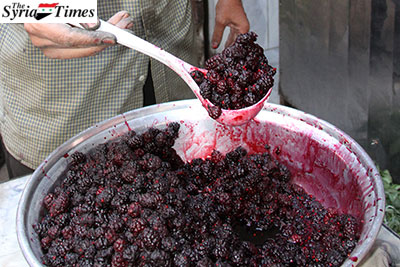The holy month of Ramadan has special flavour in Syria. One salient feature that distinguishes this great month in Syria is the thirst quencher sellers who are distributed in various parts of the country. To stroll in the city of Damascus in Ramadan, you will find many shops that sell liquorice, tamarind juice, Amaredine and other delicious cold drinks which fasters buy to quench their thirst after a long fasting day. Fasting in such hot weather requires special attention to restore balance to the body. Luckily, there are quite a few traditional Syrian refreshing cold juices that should be an important part of Ramadan meals to help people endure the next day’s heat and the long hours of fasting.
By the time the call to Maghreb prayers sounds, fasting Muslims are desperate to get their hands on that glass of water or cold drink to extinguish their thirst. Drinks in Ramadan play a main role on the Iftar table. The iftar menu in Ramadan has a variety of drinks ranging from the traditional like the sweet tamarind and Amaredine drinks to other kinds of fruit juices.
The first drink on the list these days is Amaredine, a good source of vitamins and energy. It is an excellent source of potassium, vitamin A, as well as fibre, protein and vitamin C. It is made of dried apricots boiled in water with some sugar and a little water.
Jallab is also at the top of the list of drinks to break the fast with, as do lemonade and orange and pineapple juices.
But the most popular drink in Syria is Tamarind. (Tamer Hindi in Arabic literally translates to Indian dates).
Karkadeh (Hibiscus) is a Ramadan drink, especially this year with the temperature reaching very high limits. It is worth mentioning that this drink is also preferable for many people in winter as a hot drink.
 Erk-Soos (liquorice) a black sweet and slightly bitter drink made from liquorice root. The process of making it involves putting the ground roots in a cloth and drop water over it drop by drop all night long.
Erk-Soos (liquorice) a black sweet and slightly bitter drink made from liquorice root. The process of making it involves putting the ground roots in a cloth and drop water over it drop by drop all night long.
Apart from their refreshing role, these drinks have great medical benefits. Liquorice root is often used for a variety of conditions including treatment for stomach ulcers. One animal study found that aspirin coated with liquorice reduced the number of ulcers in rats by 50%.
As for Tamarind, it contains certain health benefiting essential volatile chemical compounds, minerals, vitamins and dietary fibre.
Regarding Hibiscus, this pleasant-tasting herb with the deep-red colour also has beneficial health properties, specifically for those looking to support cardiovascular health.
K.Q.

